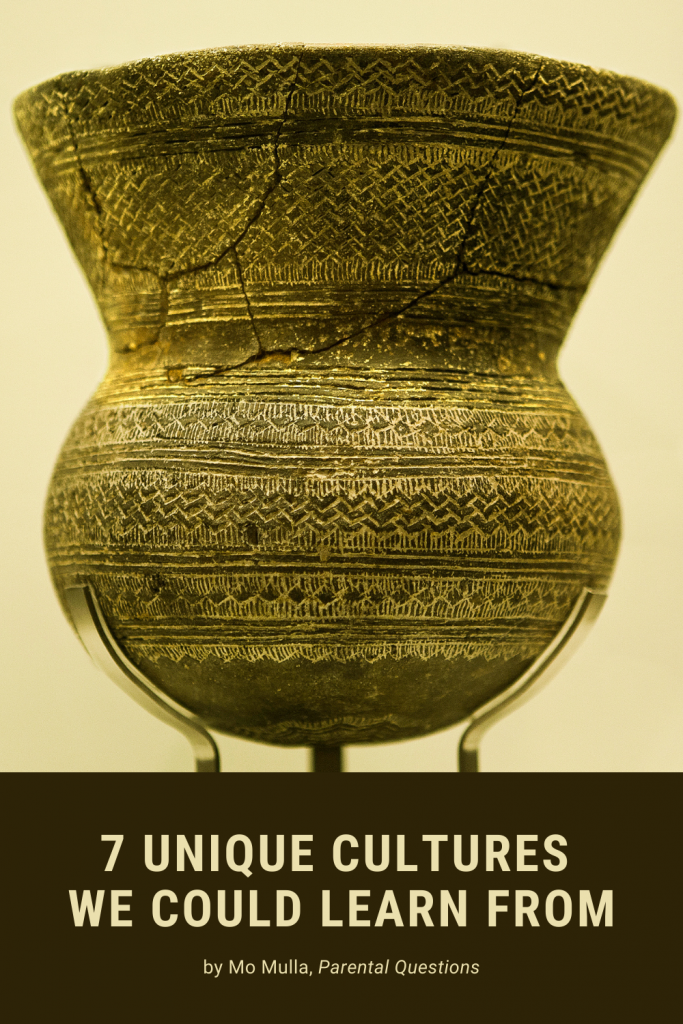7 Unique Cultures We Could Learn From
7 Unique Cultures We Can Learn From is a guest post by Mo Mulla from Parental Questions – a resource for simple & practical tips that solve everyday parental problems.
We live in a world with many different cultures. Some of these are ancient, while others are current. It’s a fascinating and diverse world we all live in, but are we aware of every culture that exists?
Children learn at an astonishing rate and while we all have Parental Questions, it’s important we continually expose our kids to new and exciting variations of life.
Below are 7 cultures most people have never heard of. Hopefully, you get a small insight into a cultural tradition or practice of somewhere new and this allows you to expand your mind and learn something new today!

- The No Tooth Fairy of Vietnam
Children in many cultures are taught to believe in the money-minting tooth fairy, one who leaves money for kids after they lose their teeth. However, the children of Vietnam toss their loose baby teeth onto rooftops of their homes.
The belief behind this practice is that it brings in a healthy replacement tooth. There is also the belief that it will bring along some good luck.
Discover more tooth traditions around the world.
- The Indus Culture
While this is an ancient culture, there are a few things that kids can learn from them. The Indus or the Harappans existed between 3300 B.C. and 1600 B.C. from the Indus River (modern-day Pakistan), the Arabian Sea to the Ganges lands in India.
The culture was quite advanced for its age, with rich architectures, art, and science practices. For example, from a 2006 study, scientists discovered some drilled molars in adult skeletons from this era.
- Finland’s Wife Carrying Culture
One way to learn about other people’s cultures is to travel. In Finland, a family get-away to the wife-carrying championship will not only be a lovely idea to visit another country but also spend time with the family.
During this championship, husbands carry their wives through the race in different styles. For instance, the Estonian style involves the woman wrapping their legs around the partner’s shoulders in an upside-down position and holding their waist.
You might not win the competition, but kids would enjoy watching their parents race in a championship. Even if you do not participate, it is an opportunity for kids to learn the importance of group work.
- Flower Gifting Culture in Russia
Did you know that different flowers have different meanings in other cultures? It is common for people to think that the red carnations flowers symbolize love, devotion, and affection.
In Russia, however, red carnations flowers are more revolutionary flowers. These flowers are given to war veterans or laid on the graves of the dead.

The flower gifting culture in Russia requires one to pay attention to the colour of the flowers, the number of stems, and the occasion. The wrong number of flowers in a bouquet could signify bad news, like farewell or death. The colours to choose also depends on the age of the receiver and this means young women are usually gifted blue or pink colours.
- The Bell-Beaker Culture
The bell-beaker culture dates back to a period between 2800 B.C. and about 1800 B.C. This ancient culture derives its name from the vessels discovered by archaeologists. These pottery vessels had an inverted bell shape and used as drinking cups.

Bjoertvedt, CC BY-SA 4.0, via Wikimedia Commons
Apart from these pottery artifacts, archaeologists also discovered other copper items and graves in what we now know as the Czech Republic.
- Salt Addition Culture in Egypt
You might love your food a little salty, but when in Egypt, you might consider skipping the salt shaker. Why? Unfortunately, adding salt to your food might look like you do not like the chef’s special.
In this culture, this could look like an insult!
- Lateness in Venezuela
The Japanese are well-known for their timekeeping. In some countries, this practice is just the opposite. Take Venezuela, for example, showing up on time is presumed as rudeness.

If you ever get invited to a party there, you better show up a few minutes later. Hosts expect guests to show at least 15 minutes after the party starts or they will think you are greedy.
Regardless of cultural practice, there is always a chance to learn something. With the above 7 cultures, you get an opportunity to teach kids about ancient and urban cultures.
They can learn about the art and scientific practices of the past. Another lesson could be how to socialize and engage with people in urban cultures like Russia and Venezuela.
 Mo Mulla is a work-from-home dad who enjoys reading and listening to music. He loves being a dad and husband to a growing family.
Mo Mulla is a work-from-home dad who enjoys reading and listening to music. He loves being a dad and husband to a growing family.
He loves writing about his passions and hopes to change the world, 1 blog post at a time!
You can find his parenting blog here: www.ParentalQuestions.com
